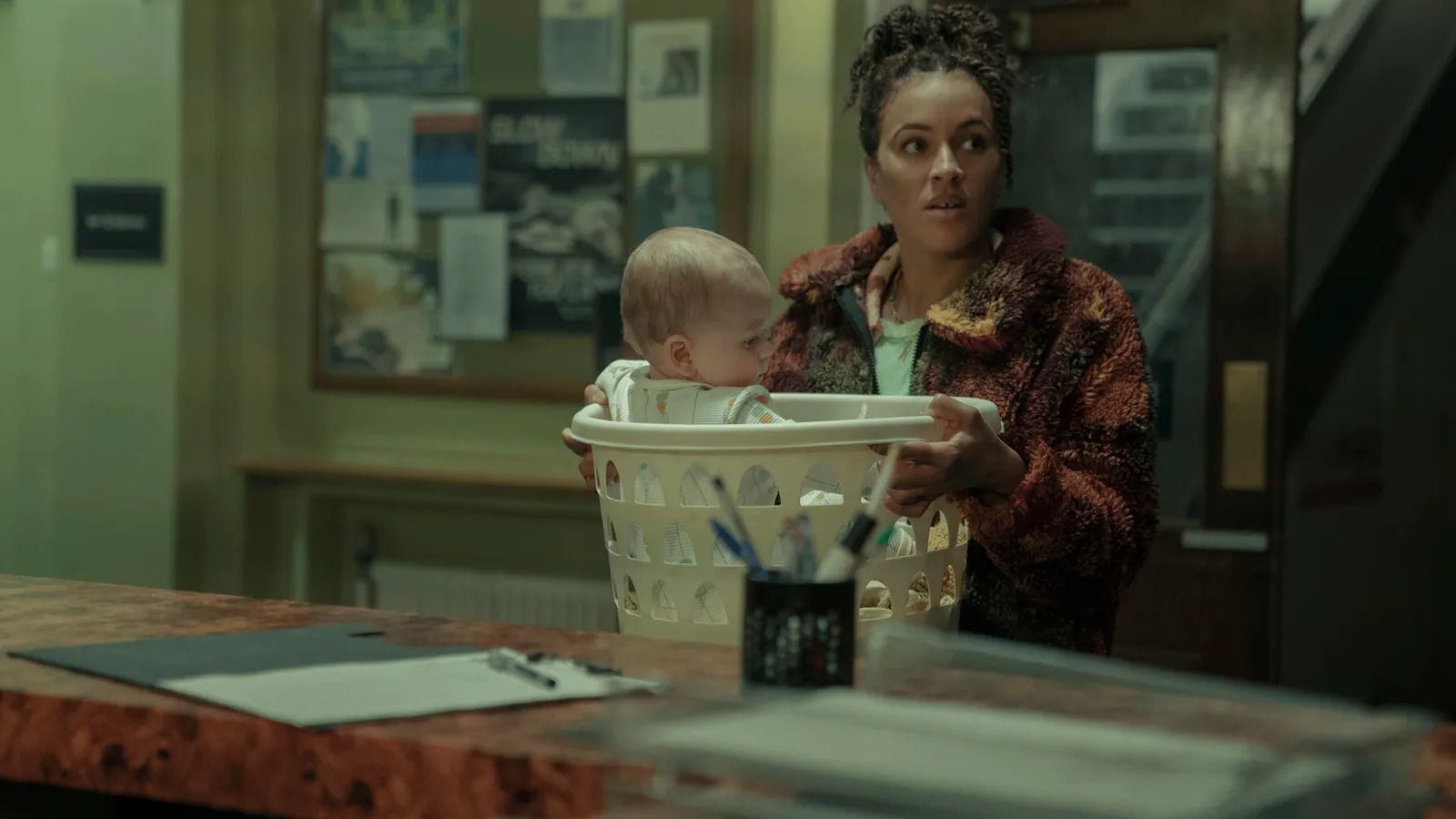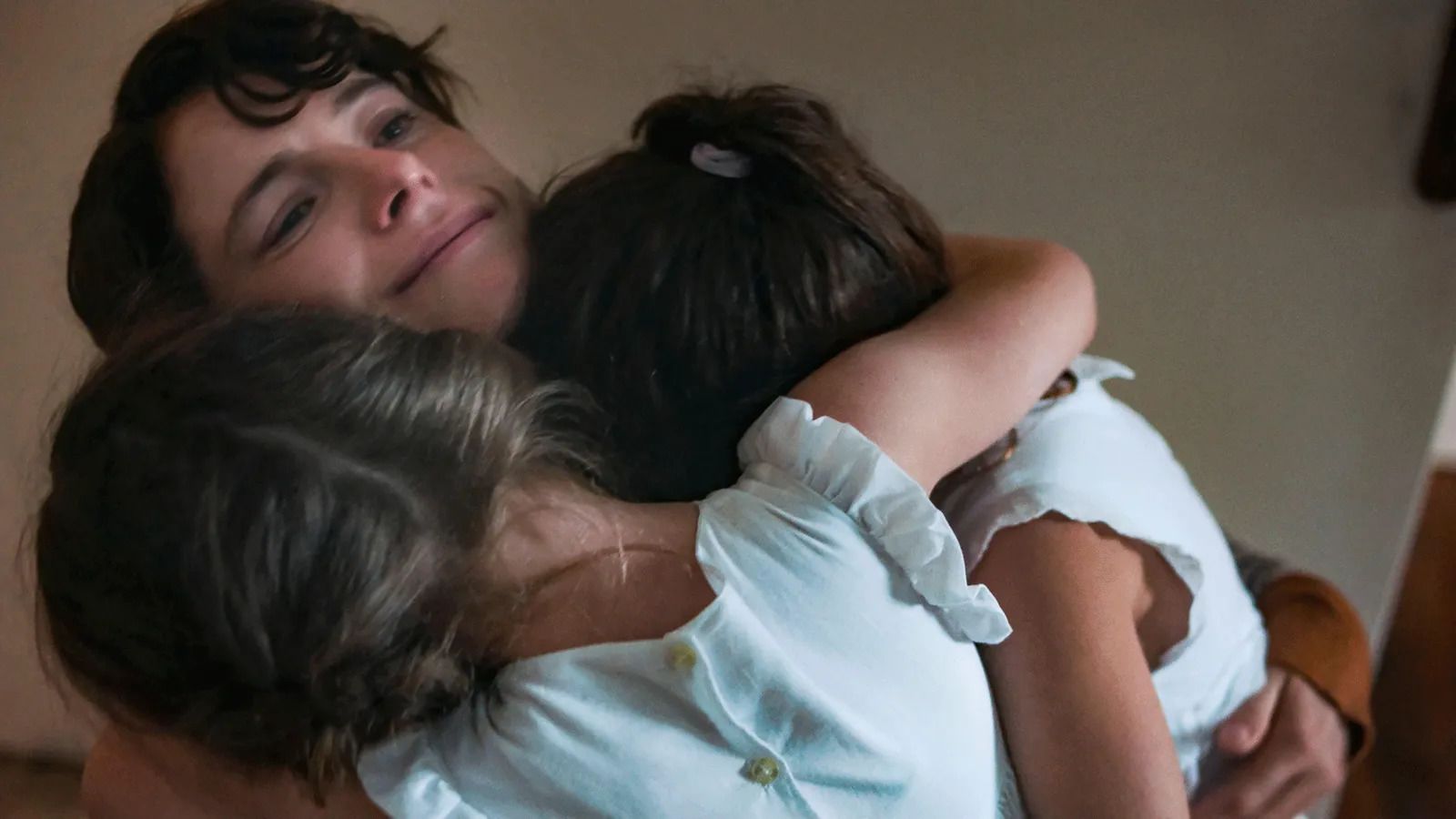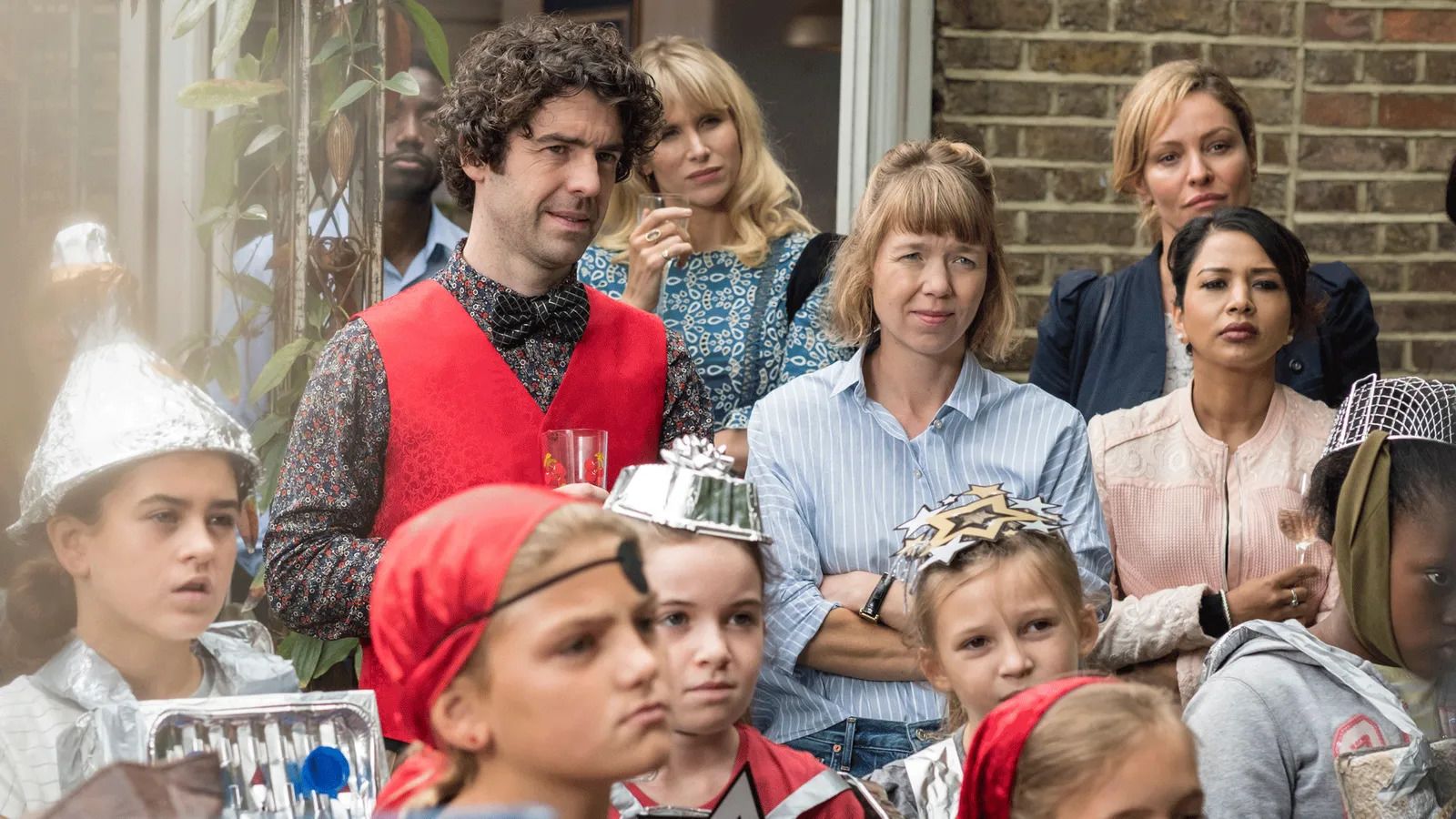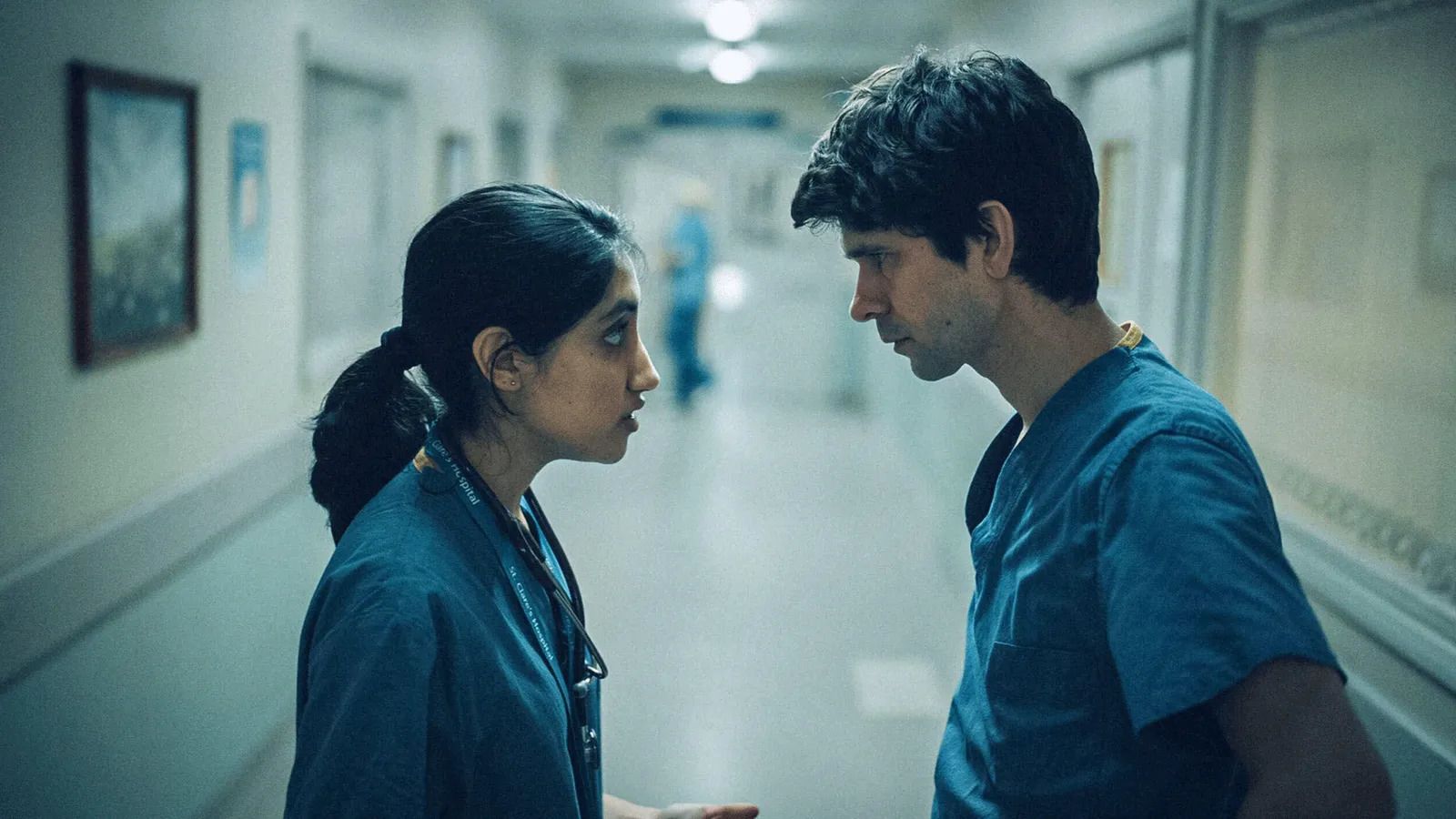
The painful truths about motherhood exposed
"He'll bulldoze your life, destroy your relationships, and when he's got you completely to himself: he'll destroy you. It's what he does," says a wizened older lady to another woman, who, in a strange series of events, has had a baby literally drop into her arms.
This statement in the third episode of the brilliantly dark TV comedy-horror The Baby (available on HBO Max in the US now; premiering in the UK today) will likely ring true with anyone tending to a screaming newborn for the sixth, seventh or eighth time in the middle of the night, and feeling like a reheated corpse the morning after – even if the predicament of its maternal protagonist may be somewhat extraordinary. In the show, despite his cherubic face and cute little yellow booties, the baby in question is destructive on an extreme scale: a murderous demon who brutally slays anyone who crosses him, giggling delightedly after each kill.
 New series The Baby tells the story of a woman who has a baby literally
drop into her arms – and turn out to be her worst nightmare
New series The Baby tells the story of a woman who has a baby literally
drop into her arms – and turn out to be her worst nightmare
Michelle De Swarte stars as Natasha, the straight-talking chef who gets pulled into the wild story when she catches a baby falling off a cliff. And while this surreal, often hilarious and gory British tale hooks you in with a plot full of twists and turns, the allegory it's presenting is crystal clear from the start: motherhood, at times, can be a total horror show.
The Baby is part of a current wave of film, TV and literature interested in laying bare the difficult, sometimes shocking realities of being a mother, from those initial discussions around having children, through to pregnancy, labour, birth and then the all-encompassing, life-long experience of raising a child. What we're seeing now is the fuller, wider spectrum of motherhood represented in fiction. And if that takes readers and viewers to a dark place sometimes, it's a sign that society is finally opening up to truthful discussions around the traditionally emotive subject.
"We were excited about the possibility of exploding cultural ideals around motherhood," says co-creator Siân Robins-Grace about the starting point for the series, "and revealing the darker, violent or oppressive forces at play in that kind of ideal account of what motherhood should be. The genre of horror obviously allows you to take that to a really extreme place, and set up some really taboo situations to explore why they might be taboo."
I think a lot of ways that motherhood is depicted is thin and uncritical – Siân Robins-Grace
Happily, breaking these taboos is something that's become especially prevalent of late. While classic films like Rosemary's Baby, The Omen and Mommie Dearest looked at the experience of motherhood as a horrifying one, the stereotype of a mother on screen has traditionally been a beatific, selfless stay-at-home wife, happily wedded to the idea that her life revolves around her children. As Robins-Grace says: "I think a lot of ways that motherhood is depicted is thin and uncritical, and reinforces the idea that 'the mother' is cis, female, straight, middle-class, white, caring and nurturing."
Her co-creator Lucy Gaymer adds that for her, the series – and genre – was a way to process her own internal battles about motherhood: "The genesis of this idea comes from me being in my 30s and feeling really confused about whether I wanted to become a parent or not, and I didn't realise that until after we'd plotted episode one, when I was like, 'Oh, of course I had that idea as it represents what it would feel like for me to become a parent right now'. It definitely comes from that place of anxiety, and also of jealousy of people who seem to feel so clearly one way or another. That feeling of not being sure feels scary and sometimes isolating."
Tapping into terror
That anxiety and isolation that women might experience while contemplating one of the biggest life decisions there is (while having an undetermined biological deadline hanging over them: a subject explored with bracing honesty by the journalist Nell Frizzell in her recent book, The Panic Years) is arguably only then exacerbated by both the reality of pregnancy and raising a young child. These emotions are again explored in heightened, terrifying terms in the 2016 film Prevenge, another horror story in which a pregnant woman's foetus orders her to carry out a series of murders to avenge her partner's death. As the baby's chipmunk-esque voice threatens her ("What did I say will happen if you don't do as I say? Blood will be shed, one way or another") it's extreme and ridiculous of course, but, deep down, speaks to fears that many carry about the power that the living being inside them holds over them. As Ruth (Alice Lowe) says about missing an ultrasound scan: "I don't want to know what's in there. I'm scared of her. I'm not even in control. It's like I'm some crap, banged out car and she's driving, I'm just the vehicle," she tries to explain to the patronising midwife, who replies with another platitude.
 The Lost Daughter bracingly showed the struggle of its heroine Leda as a young mother trying to retain her sense of self
The Lost Daughter bracingly showed the struggle of its heroine Leda as a young mother trying to retain her sense of self
While I've never procreated a homicidal infant, I have had two babies delivered prematurely by emergency C-section who both required a five-week-long stay in a NICU (neonatal intensive care unit) – and so slasher horror plot aside, the abject terror around labour and birth that the film depicts is something I can relate to. Even before my double traumatic labours, while pregnant with my first child, I remember feeling like the experience was akin to knowing you're going to be in a car crash, but you don't know when, or how bad it's going to be.
Understandably, it's hard to relax and "enjoy the pregnancy" as you're so often reminded by healthcare professionals, midwives and anyone else who happens to be walking past in the street. Portrayals in popular culture push the idea that babies are something that happen to you, rather than because of you. In Prevenge – aside from all the slash-and-kill sprees – it's implied that Ruth is already a bad mother as she's breaking the unspoken code of complying and not complaining, as her baby hasn't even been born yet. In an interview with Indiewire, Lowe – who was eight months' pregnant when she wrote, acted in and directed the film – said: "I kind of took all my frustrations of what I was feeling… Suddenly, you're a mother and people think different about you and you don't have control over your job anymore. All of this stuff, I was feeling fairly grim and dark about, and I just put it in this film."
When my son was born, instead of speaking, I wrote. I found I could be truthful on the page in a way that I could not in conversation – Marianne Levy
Another mother breaking the code is Leda, the protagonist of The Lost Daughter, Maggie Gyllenhaal's 2021 Netflix adaptation of Elena Ferrante's 2006 novel. While not a horror story, Leda (Olivia Colman) is regarded as something of a monster by the family she meets on the beach while holidaying in Greece – including the pregnant woman who she tells bluntly: "Children are a crushing responsibility". The character then flips the script on how mothers are expected to act with her unsettlingly unpredictable behaviour: she helps find a lost young girl on the beach to the relief of her family, only to steal her doll, watching the girl's devastation unfold, to play with at home. Over the course of the film, we discover she's behaved in this kind of impulsive way before, committing the most unthinkable, most transgressive of acts – in the eyes of much of society, anyway – and walking out of her family home, leaving her two young daughters behind.
Through flashbacks we see young Leda (Jessie Buckley) struggle as a young mum with her career, relationships, sexuality and personal sense of being, as well as some clearly unprocessed trauma from her own mother. The story asks the audience to confront an uncomfortable question: who was my mother before I was born? What were her desires, wills and opinions before she was in this role; and what has happened to those now?
Seeing the funny side
When it comes to the frustrations of motherhood, the sitcoms Motherland and Workin' Moms explore this territory in a lighter fashion, foregrounding in a both realistic and hilarious way the manic juggle that parents – mainly mums, if we're being honest – are expected to undertake. Mistakes will inevitably be made, and then there's the guilt and shame to contend with when this happens. A nice touch in Motherland is the absence of children in the main: rather they're seen rushing past the screen, the tops of their heads just visible as they enter school. It's the perspective of a mother's gaze, not just on her offspring, but the entire circus of life that surrounds her. Like Leda, we also see Motherland's lead character Julia (Anna Maxwell Martin) furiously grappling with her identity as a mum in a way that feels painfully authentic; juggling parenthood with wanting to be seen as a PR dynamo in her career, and as a woman of desire when she has a crush on a visiting builder.
 Sitcom Motherland offers a lighter take on the endless juggle of parenthood
Sitcom Motherland offers a lighter take on the endless juggle of parenthood
Another comedy-drama that has nailed the complications and conflicting emotions of the maternal experience is Australia's The Letdown. So much popular culture tells the story of pregnancy and birth – typically shown in a nice, neat, two-minute montage of a woman crying and screaming – and then wraps things up there. Which is why The Letdown was refreshingly unusual in starting its story when its lead character was two-months post-birth. Having been through a distressing labour, we see Audrey (Alison Bell) seriously minimising her experience and telling her mum-and-baby group: "It was fine, thanks, in the end, C-section," while also emphasising she was "not too posh to push. I didn't elect it." She's already guiltily justifying an experience that was out of her hands, in the hope that people don't judge her for it.
As the show goes on through its two series, we're shown in both banal and excruciating detail how difficult it can be just to get through the day with a newborn, and the emotional weight of the first year that hangs heavy each day. Finally, fighting back tears, Audrey admits why she's struggling: "It wasn't a great start. I kept arguing for a natural birth because I'd read all this stuff and… we nearly lost her." One of the other characters later suggests Audrey has PTSD – official figures estimate anywhere between three to nine percent of women who give birth do, although it's likely that many more women are never diagnosed. For me, that PTSD hit home on my son's first birthday – while everyone was celebrating his arrival, I was experiencing upsetting flashbacks of the anniversary of one of the scariest days of my life. Everything ended up fine, I was reminded by my partner and well-meaning friends, and that's all that mattered, wasn't it?
For me, the negative depiction of motherhood is that of the perfect mother, a woman brimming with endless tender love who never entertains a moment's negativity
The experience of mothers struggling to convince themselves they're "fine" after what can be an ordeal at the best of times – and a near-death experience at the worst of times – is perceptively examined in Marianne Levy's new book, Don't Forget To Scream. In one anecdote, she explains: "I got chatting to a mum at the school gate and I asked her about her experience of birth. 'Oh, it was awful,' she said. 'It's why I only have one. But, you know, it's fine.' 'Is it?' I said. She thought for a moment. 'No'."
Don't Forget To Scream is a collection of essays making sense of the psychological shifts and heavy emotional turmoil of becoming a mother, which also reflect on why people are so unwilling to talk about these. "After my daughter was born eight years ago, when I tried to tell people what was happening to me, they told me I was wrong, or mistaken," Levy tells BBC Culture, explaining what led her to write the book. "It was as though, on becoming a mother, my language had lost its meaning. A few times, they literally walked away. So when my son was born four years later, instead of speaking, I wrote. I found I could be truthful on the page in a way that I could not in conversation."
Taboo-busting writers
Levy, with her honest and necessary writing, joins a series of other women who have also recently written visceral books about birth and bringing up children. Mother Ship by Francesa Segal, I Am Not Your Baby Mother by Candice Brathwaite, My Wild and Sleepless Nights by Clover Stroud, and What Have I Done? by Laura Dockrill are just a few books whose candour about early motherhood is indebted to the writer that arguably first paved the way for this line of memoir, Rachel Cusk's A Life’s Work: On Becoming A Mother (2001). Cusk – an acclaimed novelist – left London with her partner and small child, found herself pregnant once again, and wrote what one reviewer described as "akin to a war diary". In an article for The Guardian in 2008, Cusk described the fall out from publishing: "I was accused of child-hating, of postnatal depression, of shameless greed, of irresponsibility, of pretentiousness, of selfishness, of doom-mongering and, most often, of being too intellectual." But equally, she noted how she was also lauded for her frankness, quoting one appreciative critic who had written how "Motherhood, as it is lived, is still individual, personal, private, and therefore deeply undervalued, sometimes even by those of us who move between the 'real' world of work and the shadow world of family life. Between these worlds, Cusk has crafted a work of beauty and wisdom."
 Comedy-drama This is Going to Hurt inspired debate about its traumatic depiction of childbirth on a British hospital ward
Comedy-drama This is Going to Hurt inspired debate about its traumatic depiction of childbirth on a British hospital ward
Other writers have notably been turning to fiction recently to portray motherhood in its most animalistic form – from the woman who metamorphosises into a dog in Rachel Yoder's Nightbitch (now being made into a film with Amy Adams) to the half-bird-half-human inspiration for Megan Hunter's tale of family life and adultery, The Harpy. Or they have gone dystopian, as with The School for Good Mothers by Jessamine Chan which examines the "bad mother" stereotype via the tale of a mother losing custody of her daughter and being sent to an institution in order to dwell on her failings.
A question that has been raised is: are all these depictions going too far toward the negative side of motherhood, to the exclusion of the positive? After all, there is, of course, a whole range of joyful experiences that mothers may have as well. However, Levy counters the idea that culture is becoming too negative about motherhood by questioning what is truly a "negative" depiction in the first place: "For me, the negative depiction is that of the perfect mother; the traditional image of a woman brimming with endless tender love who never entertains a moment's negativity (or, indeed, personality)... We seem to have removed the space for women to speak freely and openly about their experiences having and raising babies and children. The result is tremendously harmful. The consequences, for maternal mental health, the mental health of our children, and wider societal health, economics and equality, are appalling."
As Levy mentions in her book, in 2018 Dr Catriona Jones, a lecturer in midwifery, warned of "fearmongering" among women frightening each other about childbirth on online forums such as Mumsnet: "All you have to do is Google 'my experience of childbirth', and you are met with a tsunami of… women telling stories about childbirth — 'it's terrible, it's a bloodbath'," she said, in a speech at the British Science Festival. "I think that can be difficult to deal with". But arguably Jones's warning reinforces the dated notion that women are too delicate to be told the truth about some people's maternal experiences. Instead, they are asked to become complicit in a silence around mothers' pain and anguish – from that very first post-birth cliché text message "Mother and baby are doing well", which Levy calls "a lie".
The recent BBC/AMC adaptation of Adam Kay's bestselling medical memoir, This Is Going To Hurt, which follows Kay's real-life experiences as a junior doctor on an Obstetrics and Gynaecology ward in a British hospital, also came under fire for its traumatic scenes of women giving birth, as well what "positive birth" expert Milli Hill called the "paternalistic, misogynistic attitude" of Kay towards his female patients. But others argued the depiction of the maternal experience was creditable for being uncomfortably real. Times journalist Alice Jones wrote that she "didn't feel angry watching This Is Going to Hurt, I felt glad that someone was telling the truth. Birth can be beautiful, but it's also brutal. What are we going to do about that?"
Culture exploring the darker side of motherhood may also now have an extra resonance at a time when, in the US, some states are intending to remove the constitutional right to an abortion, after the Supreme Court overturned the case of Roe vs Wade. In one harrowing episode of The Baby, we see how the titular child's biological mother – Helen (Tanya Reynolds) – is held hostage and forced to give birth, in scenes reminiscent of The Handmaid's Tale; Robins-Grace explains how differently that scene hits home for her now. "It's sobering to realise that we were naive to believe, in a legislative way, that [abortion] was off the table."
More generally, the fact that current films, TV series and books might shock us and shatter our collective illusions about motherhood is only a good thing, says Levy. "Popular culture finally seems to be waking up to the idea that mothers can be interesting, dynamic characters in their own right, front and centre to the story, with all the foibles and flaws and fascinating facets exhibited by the rest of humanity."











